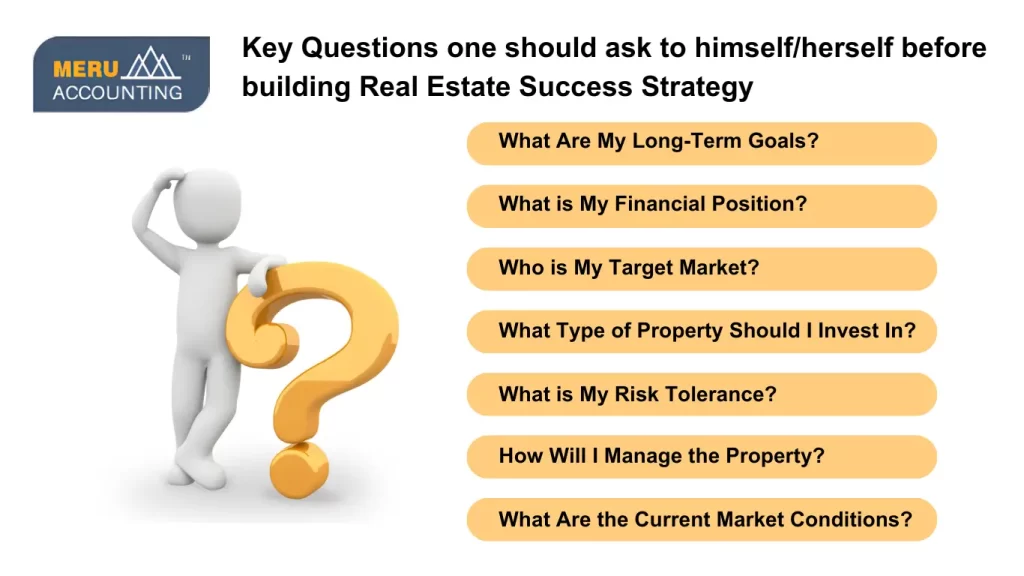What Question Should You Ask Yourself Before Building Your Real Estate Strategy
Developing a solid strategy for real estate investment is essential to make informed decisions and achieve financial success. Whether you’re new to real estate or an experienced investor, asking the right questions can guide you toward a clear, effective plan. A good strategy for real estate goes beyond simply buying properties; it involves careful consideration of your goals, financial capacity, market knowledge, and risk tolerance.
Key Questions one should ask to himself/herself before building Real Estate Success Strategy
1. What Are the Long-Term Goals?
- Do you want to earn steady rental income, focus on the appreciation of the property’s value, or aim for a combination of both? Defining your goals early on will shape the direction of your investments and help you choose the right properties.
2. What is my Financial Position?
- Assessing your financial position is a crucial step. Consider how much capital you currently have, your financing options, and any potential liabilities. Knowing your financial limits will allow you to make realistic investment choices that suit your budget and long-term financial plan.
3. Who is My Target Market?
- Identifying your target market is essential for choosing properties that appeal to specific demographics or locations. Decide whether you want to focus on families, young professionals, or another group. Understanding the preferences of your target audience can guide you in selecting the right type of property and location.
4. What Type of Property Should I Invest In?
- Determine if you want to invest in residential, commercial, industrial, or mixed-use properties. Each property type has different benefits and challenges, so consider your goals, financial position, and risk tolerance. Residential properties are often seen as more stable, while commercial properties might offer higher income potential.
5. What is My Risk Tolerance?
- Ask yourself how much risk you’re comfortable taking. While high-risk investments may offer larger returns, they also come with the chance of significant losses. Understanding your risk tolerance will help you choose properties and investment strategies that align with your comfort level.
6. How Will I Manage the Property?
- Managing a property on your own requires time and effort, but it may save on costs. Alternatively, a property management company can handle day-to-day operations, although it will add to your expenses.
7. What Are the Current Market Conditions?
- Stay informed about the real estate market. Look at current property values, demand trends, and other economic indicators. Market conditions will affect property prices and demand, so knowing the state of the market can help you make smarter investment choices.
8. What Is My Target Market?
- Are you targeting first-time homebuyers, luxury buyers, renters, or commercial tenants?. What is the demographic profile of your ideal tenant or buyer (age, income, lifestyle, location)?Are there emerging neighbourhoods or regions where demand is.
9. How Will I Finance My Investments?
- Explore different financing options, such as mortgages, partnerships, or private investors. Your choice of financing will determine how much you can invest and the type of properties you can afford.
10. What is My Exit Strategy?
- An exit strategy is a plan for how and when to sell or refinance your investment. It helps maximize your profits and ensures you can transition smoothly out of your investment when needed. Having a clear exit plan in place keeps your long-term financial goals in focus.
Conclusion
By asking these questions, you can build a well-rounded strategy for real estate investment that aligns with your financial goals and resources. Understanding your objectives, target market, and risk tolerance will guide you to make informed, strategic decisions for successful real estate investing. To further strengthen your investment journey, Meru Accounting offers expert strategy for real estate businesses as well as financial services, helping to manage and optimize your real estate finances with precision. Our experience in accounting and financial planning can provide you with the support needed to keep your strategy on track and focused on long-term success.


